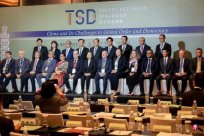Taiwanese scholars and experts believe that after the Chinese official meeting with the US President Biden, the Chinese and American military communication mechanisms were fully recovered and returned to the former American House of Representatives Nancy Pelosi to visit Taiwan in August 2022.But there are structural contradictions between the two sides, and there are still many variables in the future.
The National Policy Research Institute held a symposium on "Observation of the focus of the United States and China and APEC Summit" on Friday (November 17). Participants and reminded Taiwan to strengthen their strength in orderChallenge.
Lin Zhengyi, a researcher at the European and American Research Institute of the Central Academy of Sciences, believes that this time the worship was not just returning to the Bali Island to meet last year, but returned to Perosi to visit Taiwan.Almost all the Sino -US frozen projects have recovered, and the deadlock in China and the United States has turned over.
But Lin Zhengyi also pointed out that there are still many variables in Sino -US relations, which will not be smooth sailing, including continuous warfare warfare around the South China Sea and the Taiwan Strait, and scientific and technological surrounds, high tariffs and economic and trade war will continue.
Gao Shuotai, a former representative of Taiwan in the United States and a senior consultant of the National Policy Institute, said that the Xi -worship meeting was that there was a need for China and the United States. As a result, the atmosphere was improved, but the mutual trust was still insufficient.
Su Ziyun, director of the National Defense Strategy and Resources Research Institute of the National Defense Security Research Institute, described that this Xi -worship meeting was to install the "political fuse" because the Chinese military report of the US Department of Defense announced that there were 180 dangers in China and US military aircraft in the past two years.In contact, it is necessary to restore communication and reduce tension. At the same time, the importance of the stability of the stability of the Taiwan Star of the Seven Group (G7) and the Bayeon Researching Taiwan Sea also shows that Taiwan's strategic position has been confirmed again.
Li Baowen, an associate professor of the Institute of China and the Asia -Pacific Regional Research Institute of Kaohsiung University, pointed out that the strategic confrontation between China and the United States belongs to a structural contradiction.For the United States, "pursuing dialogue and reducing misjudgments" is the responsibility and obligation of the United States as the power of Indo -Pacific to avoid the transformation of strategic competition between China and the United States into a military conflict.Therefore, the logic of the United States is "confrontation when the confrontation should be confrontated, and the dialogue should be dialogue."
He believes that the downward pressure on the mainland of China has made its foreign policies not change the space, from confrontation to cooperation, and continue to have a high probability of competition, and the decline of the mainland may be more dangerous than the rise of the mainland. After all, if the beauty is beautifulMiddle conflict or conflict between the Taiwan Strait must occur. The mainland has the motivation to mobilize military operations before completely recession and weakness to avoid being completely subject to people.
Ma Zhenkun, a professor at the Institute of Military Affairs of the Communist Party of China of the National Defense University, said that there are also structural contradictions in the Sino -US military relations. The consensus of Xi Make -worship will help restart the military communication between China and the United States, but it does not help improve the military relations between China and the United States.
He explained that this structural contradiction is that the CCP adheres to the Taiwan Strait, the South China Sea, and the East China Sea belongs to the core interests of China.Outside the East China Sea; the United States has established a security order with its military hegemony as its core since World War II, and has maintained the military existence of the United States in the region with the garrison of Japan, South Korea and the Philippines.
In other words, the core interests advocated by Beijing mean to change the status quo of regional security, and maintaining the existing security order is a major US strategic interest.
In addition, Chinese officials have denied a plan to move Taiwan in 2027 or 2035 in the Xi -worship meeting, reiterating peace and unity, but it does not rule out the use of force.
Jie Zhong, an associate researcher at the National Policy Research Foundation of the Kuomintang Think Tank, believes that at this stage, although the CPC Central Committee has a "unified road diagram" on both sides of the strait, there is no rigid "unified time table", and naturally there will be no "attack time time.surface".
But this does not mean that the two sides of the strait have been separated from the "mighty war" situation. As long as the cross -strait changes have made the CCP unacceptable, such as Taiwan's pursuit of legal Taiwan independence or military accidents, it is very likely to cause war.


